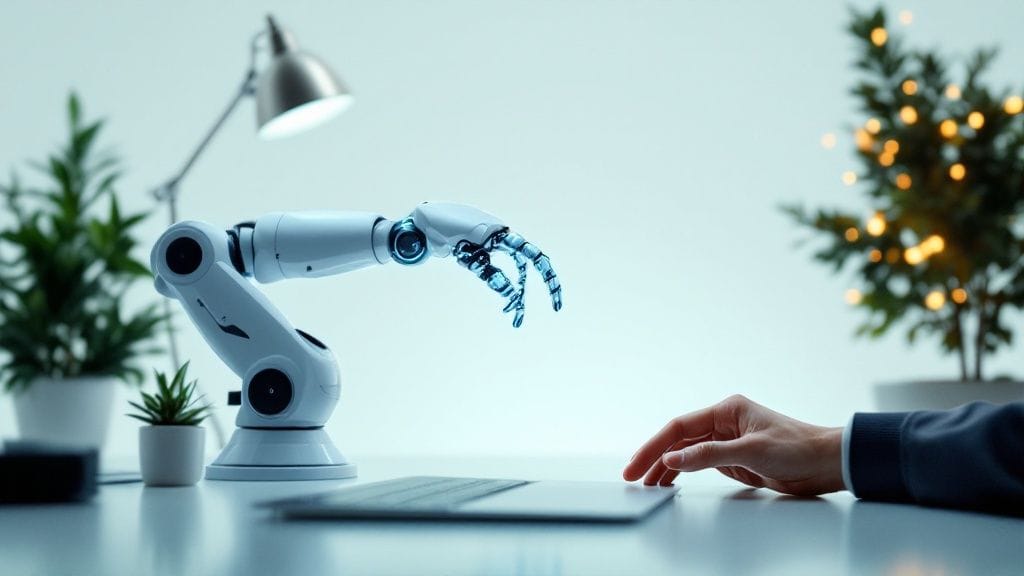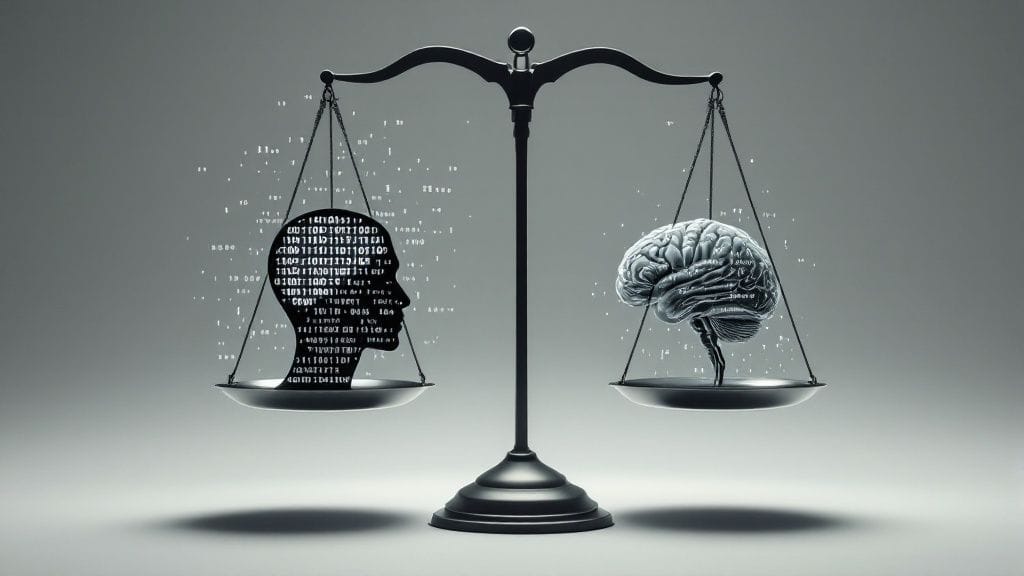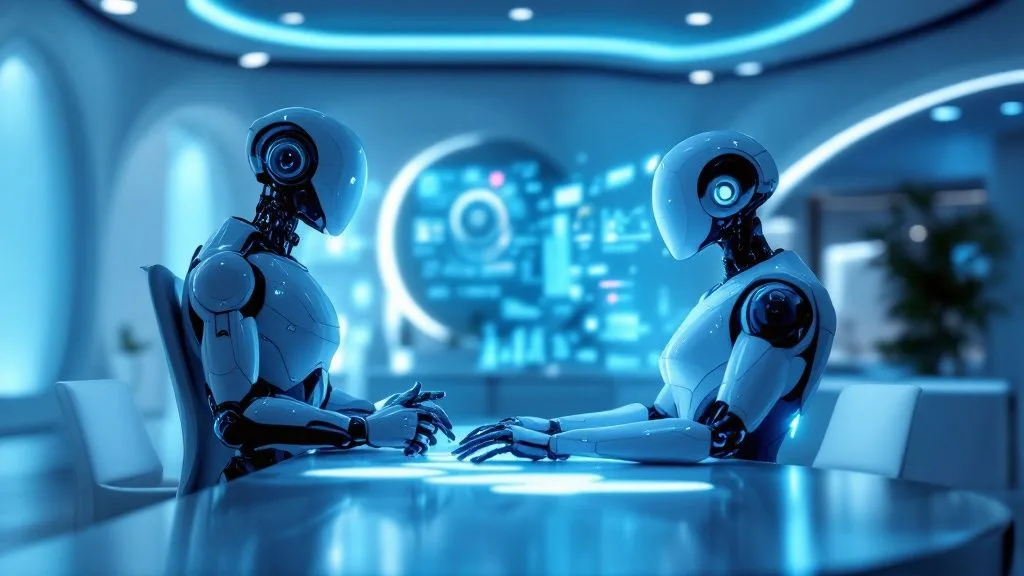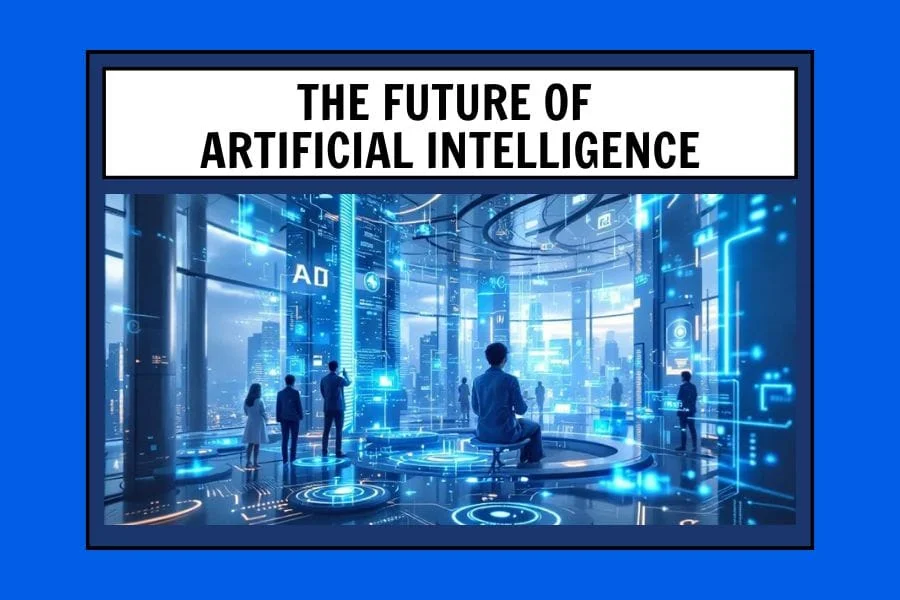Discover the future of artificial intelligence as it reshapes industries, drives innovation, tackles ethical challenges, and transforms our world with endless possibilities. AI is not only transforming businesses but society as well.
AI is Reshaping Industries and Driving Global Growth
The global AI market, presently valued in the billions, is forecast to reach nearly $2 trillion by 2030. This anticipated growth isn’t just speculation; it reflects the growing presence of AI in our everyday lives and its integration across diverse industries. This integration is driven by practical needs and an increasing awareness of what AI can do.
For instance, AI is already automating customer service, personalizing online experiences, and even contributing to medical diagnoses. This growing dependence on AI solutions highlights the importance of understanding not just its possibilities, but its limitations and ethical implications as well. This means that as AI systems become more complex, our strategies for developing and deploying them must also evolve. This evolution requires careful consideration of ethical implications, which will be crucial for shaping the future of AI.
The future of AI also relies heavily on responsible innovation. Much like the internet transformed communication and commerce, AI is poised to reshape entire industries, from healthcare and finance to transportation and entertainment. However, with this potential comes significant responsibility. As AI systems gain more autonomy, concerns about bias, accountability, and transparency become increasingly critical. These ethical considerations are not just theoretical; they will have a direct impact on how AI is developed and adopted in the years to come. The future of AI hinges on our ability to harness its transformative power while upholding ethical development and deployment.
Current State of AI

Building on our understanding of AI’s potential, it’s important to examine the current state of artificial intelligence. The field is marked by significant progress in key areas, forming the basis for the future of AI. These aren’t just theoretical advancements; they are practical applications that are already impacting our lives.
Key Advancements in AI
- Machine Learning (ML): Machine learning allows systems to learn from data without explicit programming. A good example is spam filters that learn to recognize new spam tactics based on user feedback. This learning capability is fundamental to many AI-powered services we use daily and is vital for developing adaptive AI systems.
- Natural Language Processing (NLP): NLP focuses on enabling computers to understand and generate human language. As a result, AI can now translate languages, summarize text, and even create human-like text, powering tools like chatbots and virtual assistants. These advances are reshaping our interactions with technology.
- Computer Vision: Computer vision gives computers the ability to “see” and interpret images and videos. This technology is crucial for self-driving cars, facial recognition systems, and medical imaging diagnostics. Consequently, computer vision has become an integral part of many industries.
- Deep Learning: Deep learning, a subset of ML, uses artificial neural networks with multiple layers to analyze data. Think of it as creating a more sophisticated “brain” for AI, allowing it to tackle intricate tasks such as recognizing subtle patterns in medical images. This powerful technique is expanding the horizons of AI capabilities.
AI Integration
These AI advancements are not confined to research labs. They are now being actively applied across numerous sectors, transforming industries and our relationship with technology. This widespread AI integrations are a clear indication of AI’s potential to revolutionize how we live and work.
AI Impact on Industries
The increasing integration of AI across industries signifies a fundamental shift in how businesses operate and compete. The future of AI is inextricably linked with the future of these sectors, promising greater efficiency, innovative products and services, and new ways of interacting with the world. This impact is already transforming traditional practices and creating new opportunities.
Digital Entrepreneurship
An increasing number of entrepreneurs are leveraging AI across various digital business models. AI plays a vital role in digital entrepreneurship by enhancing efficiency, enabling personalized customer experiences, streamlining data analysis, and supporting smarter decision-making. Entrepreneurs can use AI to accelerate the creation of innovative products and services, refine marketing strategies, and stay ahead of the competition by automating routine tasks. Additionally, AI helps uncover critical insights from massive datasets, driving faster growth and delivering superior customer experiences. The future of artificial intelligence lies in empowering businesses to innovate and operate with unprecedented efficiency.
Healthcare
Healthcare is one area where AI holds immense promise. Consider AI a tireless medical assistant, capable of analyzing medical images to detect early signs of disease, supporting complex surgeries, and tailoring treatment plans to individual patients. AI’s ability to analyze large datasets and identify patterns allows for quicker diagnoses and more effective treatments. For instance, AI algorithms can analyze medical images like X-rays and MRIs faster and more accurately than humans, potentially spotting subtle signs a doctor might overlook. This early and accurate detection is critical for diseases like cancer. AI is also speeding up drug discovery by predicting the effectiveness of new drugs, cutting down the time and cost of traditional development processes.
Finance
The financial industry is experiencing a major transformation, largely due to AI. Imagine AI algorithms continuously monitoring market activity, identifying fraudulent transactions, and offering personalized financial guidance. This constant monitoring and analytical ability significantly improves efficiency and security. For instance, AI-powered systems can detect fraudulent activity in real-time, preventing financial losses and protecting consumers. AI also simplifies loan applications and automates investment decisions, making financial services more accessible and efficient. This automation allows human analysts to focus on more complex and strategic work.
Manufacturing and Automation
In manufacturing, AI is driving greater automation and efficiency. Picture a factory where robots work alongside humans, completing repetitive tasks with high precision and adapting to changing production needs. This collaboration optimizes production and minimizes human error. For instance, AI-powered robots can manage tasks like assembly, welding, and painting, allowing human workers to concentrate on quality control and more intricate operations. This increases productivity and enhances safety by reducing human involvement in potentially dangerous tasks. The combination of AI and robotics is reshaping manufacturing, leading to smarter and more adaptable factories.
Transportation
The transportation sector is undergoing a dramatic shift fueled by AI. Self-driving cars are no longer a futuristic dream; they’re becoming a reality and are set to revolutionize how we travel. This progress in autonomous vehicles relies on AI’s ability to process massive amounts of data from sensors, cameras, and GPS, allowing vehicles to navigate complicated environments and make decisions in real-time.
For example, AI algorithms enable self-driving cars to perceive and respond to their surroundings, including other vehicles, pedestrians, and traffic signals. This has the potential to significantly improve road safety by minimizing human error, a major cause of accidents. AI is also optimizing traffic flow in cities, reducing congestion, and enhancing transportation network efficiency. These developments showcase AI’s transformative potential within transportation.
AI Ethical Considerations

As AI becomes increasingly integrated into our lives, it’s crucial to discuss the ethical considerations surrounding its development. Responsible AI development requires careful consideration of potential moral implications. This involves addressing potential biases, establishing clear lines of accountability, and promoting transparency within AI systems. These are not just abstract ideas; they are practical challenges that we must address to ensure a positive future with AI.
Bias in AI
One major concern is the risk of bias within AI algorithms. These algorithms learn from large datasets, and if these datasets reflect societal biases (such as gender or racial bias), the AI system may perpetuate and even amplify those biases. For example, an AI system used in loan applications could unfairly discriminate against certain demographic groups if the training data contained historical biases in lending practices. Therefore, carefully selecting and cleaning training data is essential to minimize bias. Ongoing monitoring and evaluation are also critical for identifying and addressing any emerging biases throughout an AI’s lifecycle.
Accountability and Transparency
Accountability is another key ethical concern. As AI systems gain autonomy, it becomes more challenging to assign responsibility when errors occur. For example, if a self-driving car causes an accident, who is at fault – the owner, the manufacturer, or the AI itself? This ambiguity calls for clear guidelines and regulations on accountability. This issue is closely linked to transparency. We need to understand how AI systems reach their decisions, especially in critical fields like healthcare and finance, where the consequences of AI-driven decisions can be significant.
However, the complexity of some AI models, especially deep learning models, can make it difficult to understand their internal workings, leading to a “black box” effect. Overcoming this challenge requires developing methods to explain AI decisions and promoting greater transparency. Ethical AI companies must establish clear ethical guidelines and regulatory frameworks that foster trust and ensure responsible AI development. This framework must consider not just the technical aspects of AI but also its societal impact. The future of AI depends on our ability to navigate these ethical complexities and build systems that are not only powerful but also fair, transparent, and accountable.
AI Future Predictions

After examining the ethical considerations, we can explore the exciting possibilities that the future of AI holds. This involves not just projecting current trends but also considering potential disruptive innovations that could change the AI landscape in unpredictable ways. Just as the smartphone revolutionized mobile technology, unexpected breakthroughs could revolutionize AI.
The Rise of Explainable AI (XAI)
One notable trend is the growing emphasis on explainable AI (XAI). XAI addresses the “black box” problem of complex AI models by making their decision-making processes more transparent and understandable. For example, imagine a doctor using an AI diagnostic tool. Currently, many AI systems provide a diagnosis without explaining the reasoning. XAI aims to change this by providing clear explanations, which builds trust and allows humans to better understand and validate AI insights. This increased transparency is vital for building trust and establishing accountability, especially in vital applications like healthcare and finance. This development is essential for the wider adoption of AI.
AI-Powered Creativity and Innovation
The future of AI isn’t solely about automation; it’s about augmentation too. AI is becoming increasingly skilled in creative tasks, assisting artists, writers, and musicians in producing original work. Think of AI as a creative collaborator, providing new ideas, generating different artistic styles, and helping humans push the boundaries of artistic expression. For example, AI tools can now compose music, create art, and even write stories, opening exciting avenues for creativity and potentially leading to entirely new art forms. This collaboration between humans and AI has the potential to enrich the creative landscape.
The Convergence of AI and Other Technologies
The convergence of AI with other emerging technologies is another important aspect of its future. Combining AI with the Internet of Things (IoT), blockchain, and quantum computing could lead to groundbreaking innovations. For instance, imagine smart cities powered by AI and IoT, optimizing traffic flow, minimizing energy consumption, and personalizing public services. This interconnected network of AI-powered devices has the potential to transform urban life. The integration of AI with blockchain could enhance security and transparency in various sectors, while the development of quantum AI could open up entirely new computational possibilities, further accelerating AI advancement in ways we can only imagine.
AI for Social Good
Lastly, the future of AI offers enormous potential for addressing global challenges. From climate change and poverty to disease and education, AI can be a powerful tool for social good. This could involve using AI to develop more sustainable agricultural practices, personalize education, or accelerate the discovery of new treatments for diseases. These applications demonstrate AI’s potential to positively impact society and improve lives worldwide. Developing and implementing AI for social good is essential for realizing its full potential and creating a more equitable and sustainable future. This emphasis on positive impact is crucial for building public trust and ensuring that AI benefits all of humankind.
Conclusion
The future of artificial intelligence is not just a technological evolution; it represents a profound societal shift. From automating routine tasks to expanding the boundaries of creative expression, AI is set to reshape industries and transform how we interact with the world. We’ve explored how the current state of AI, with its advancements in machine learning, natural language processing, computer vision, and deep learning, is already making an impact on sectors like healthcare, finance, manufacturing, and transportation. This impact will only intensify as AI continues to develop, offering incredible opportunities and presenting significant ethical considerations.
Navigating this future requires a balanced approach. We must embrace the transformative possibilities of AI while carefully considering its ethical implications. Addressing issues such as bias, accountability, and transparency is crucial for building trust and guaranteeing that AI benefits everyone. We must also anticipate and prepare for the convergence of AI with other technologies like IoT, blockchain, and quantum computing, which will undoubtedly unlock further innovation and shape the future in unpredictable ways.
AI simplified is the ultimate goal. Furthermore, the future of AI depends on our commitment to responsible development and implementation. As AI tech solutions become increasingly woven into our lives, prioritizing human well-being and societal benefit is essential. This includes focusing on AI for social good, leveraging its power to address global challenges and build a more just and sustainable future. The future of AI is not preordained; it’s a future we are actively creating, and the choices we make today will define the world of tomorrow.
FAQs: Future of Artificial Intelligence
What industries are being most affected by AI right now?
Answer: Future of Artificial Intelligence
AI is transforming industries like digital entrepreneurship, healthcare, finance, manufacturing, and transportation. For instance, AI is used to personalize customer experiences in e-commerce, improve diagnostic accuracy in healthcare, detect fraud in banking, streamline supply chains, and enable self-driving technology.
How can AI benefit small business owners and entrepreneurs?
Answer: Future of Artificial Intelligence
AI can help small businesses optimize operations, enhance marketing efforts, and provide better customer experiences. Tools like chatbots, predictive analytics, and AI-powered CRM systems allow entrepreneurs to compete with larger companies by automating repetitive tasks and gaining actionable insights.
What are the biggest ethical challenges facing AI development?
Answer: Future of Artificial Intelligence
Bias in AI algorithms, accountability for AI decisions, and ensuring transparency in AI processes are significant ethical challenges. These issues arise from biased training data, lack of regulatory oversight, and the opaque nature of some AI models, making it difficult to ensure fairness and trustworthiness.
Will AI take over jobs in the future?
Answer: Future of Artificial Intelligence
AI will likely replace some repetitive and manual jobs but will also create new opportunities. The future workforce will require reskilling and adaptation, focusing on roles that leverage human creativity, emotional intelligence, and the ability to collaborate with AI systems.
What is Explainable AI (XAI), and why is it important?
Answer: Future of Artificial Intelligence
Explainable AI (XAI) refers to AI systems designed to make their decision-making processes understandable to humans. This transparency is crucial for trust, regulatory compliance, and ethical use, particularly in sensitive applications like healthcare, finance, and law enforcement.
How is AI contributing to social good?
Answer: Future of Artificial Intelligence
AI is being used to address global challenges such as climate change, poverty, and public health crises. Examples include AI-powered disaster response systems, predictive models for disease outbreaks, and optimizing resource distribution in underserved communities.
For digital entrepreneurs seeking to harness the power of advanced technologies, consider this All-In-One Digital Business Solution: [JOIN HERE FOR FREE]





